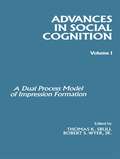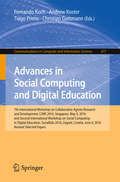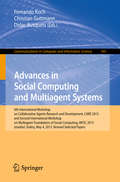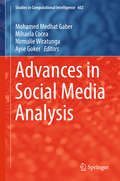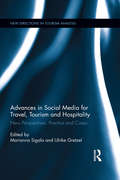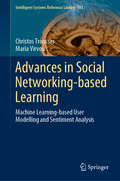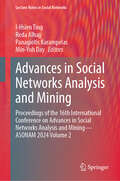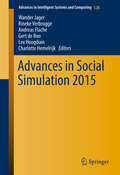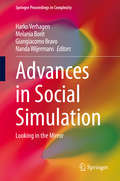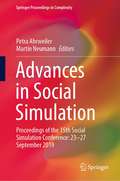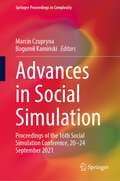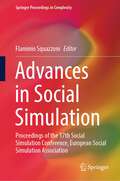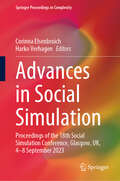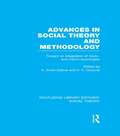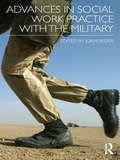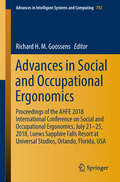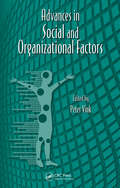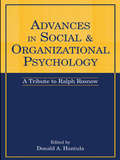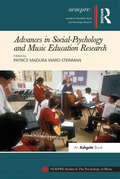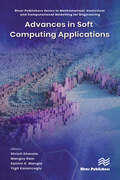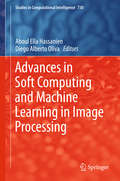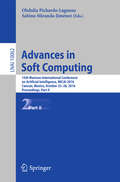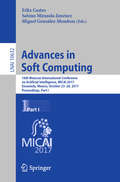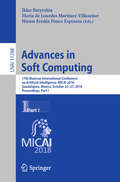- Table View
- List View
Advances in Social Cognition, Volume I: A Dual Process Model of Impression Formation (Advances in Social Cognition Series)
by Jr. Robert S. Wyer Thomas K. SrullThis volume presents different perspectives on a dual model of impression formation -- a theory about how people form impressions about other people by combining information about a person with prior knowledge found in long-term memory. This information is of real importance to graduate students and advanced undergraduates in cognitive and social psychology, experimental psychology, social cognition and perception. Each volume in the series will contain a target article on a recent theoretical development pertinent to current study followed by critical commentaries offering varying theoretical viewpoints. This productive dialogue concludes with a reply by the target article author. The first volume of the series presents an evaluation of theoretical advances in social cognition and information processing from new and different perspectives. Volume 2 presents a new conceptualization of personality and social cognition by Cantor and Kihlstrom which addresses both new and old issues. The volumes in this series will interest and enlighten graduate and advanced undergraduates in cognitive and social psychology, experimental psychology, social cognition and perception. The first volume of the series presents an evaluation of theoretical advances in social cognition and information processing from new and different perspectives. Each volume in the series will contain a target article on a recent theoretical development pertinent to current study followed by critical commentaries offering varying theoretical viewpoints. This productive dialog concludes with a reply by the target article author. The information provided in Volume 1 promises to enrich graduate and advanced undergraduates in cognitive and social psychology, experimental psychology, social cognition and perception. This first volume of the series evaluates the theoretical advances made in social cognition and information processing from new and different perspectives. This unique and lively interchange between the target article author and the critics will enrich and enlighten psychologists from many disciplines. Each volume in the series will contain a target article on a recent theoretical development pertinent to current study followed by critical commentaries offering varying theoretical viewpoints. This productive dialog concludes with a reply by the target article author. The first volume of the series presents an evaluation of theoretical advances in social cognition and information processing from new and different perspectives. Volume 2 presents a new conceptualization of personality and social cognition by Cantor and Kihlstrom which addresses both new and old issues. All volumes in this series will interest and enlighten graduate and advanced undergraduates in cognitive and social psychology, experimental psychology, social cognition and perception.
Advances in Social Computing and Digital Education: 7th International Workshop on Collaborative Agents Research and Development, CARE 2016, Singapore, May 9, 2016 and Second International Workshop on Social Computing in Digital Education, SocialEdu 2016, Zagreb, Croatia, June 6, 2016, Revised Selected Papers (Communications in Computer and Information Science #677)
by Fernando Koch Christian Guttmann Andrew Koster Tiago PrimoThis book constitutes the refereed proceedings of the 7th International Workshop on Collaborative Agents Research and Development, CARE 2016, held in Singapore in May 2016 and Second International Workshop on Social Computing in Digital Education, SocialEdu 2016, held in Zagreb, Croatia, in June 2016. For CARE 2016 there were 4 papers selected out of 7 submissions, and for SocialEdu 5 papers were selected from 7 submissions. The 9 extended and revised full papers presented were carefully reviewed. The papers deal with topics like techniques of continuous monitoring, human behaviour analysis, recommendation systems, adjustment of education activities, intelligent content placement, and others.
Advances in Social Computing and Multiagent Systems: 6th International Workshop on Collaborative Agents Research and Development, CARE 2015 and Second International Workshop on Multiagent Foundations of Social Computing, MFSC 2015, Istanbul, Turkey, May 4, 2015, Revised Selected Papers (Communications in Computer and Information Science #541)
by Fernando Koch Christian Guttmann Didac BusquetsThis book constitutes thoroughly revised, selected papers of the proceedings of the 6th International Workshop on Collaborative Agents Research and Development, CARE 2015 and the Second International Workshop on Multi-agent Foundations of Social Computing, MFSC 2015, held in Istanbul, Turkey, on May 4, 2015. Both Workshops were held in conjunction with AAMAS 2015. The 5 revised full papers of CARE and the 7 full papers of MFSC presented were carefully selected from 14 CARE and 10 MFSC submissions. Both workshop address issues in relevant areas of social computing such as smart societies, social applications, urban intelligence, intelligent mobile services, models of teamwork and collaboration.
Advances in Social Media Analysis (Studies in Computational Intelligence #602)
by Mihaela Cocea Mohamed Medhat Gaber Nirmalie Wiratunga Ayse GokerThis volume presents a collection of carefully selected contributions in the area of social media analysis. Each chapter opens up a number of research directions that have the potential to be taken on further in this rapidly growing area of research. The chapters are diverse enough to serve a number of directions of research with Sentiment Analysis as the dominant topic in the book. The authors have provided a broad range of research achievements from multimodal sentiment identification to emotion detection in a Chinese microblogging website. The book will be useful to research students, academics and practitioners in the area of social media analysis.
Advances in Social Media for Travel, Tourism and Hospitality: New Perspectives, Practice and Cases (New Directions in Tourism Analysis)
by Ulrike Gretzel Marianna SigalaThis book brings together cutting edge research and applications of social media and related technologies, their uses by consumers and businesses in travel, tourism and hospitality. The first section addresses topical issues related to how social media influence the operations and strategies of tourism firms and help them enhance tourism experiences: open innovation, crowdsourcing, service-dominant logic, value co-creation, value co-destruction and augmented reality. The second section of the book looks at new applications of social media for marketing purposes in a variety of tourism-related sectors, addressing crowd-sourced campaigns, customer engagement and influencer marketing. The third section uses case studies and new methodologies to analyze travel review posting and consumption behaviors as well as the impact of social media on traveller perceptions and attitudes, with a focus on collaborative consumption and sharing economy accommodation. Finally, the fourth section focuses on hot topics and issues related to the analysis, interpretation and use of online information and user-generated content for deriving business intelligence and enhancing business decision-making. Written by an international body of well-known researchers, this book uses fresh theoretical lenses, perspectives and methodological approaches to look at the practical implications of social media for tourism suppliers, destinations, tourism policy makers and researchers alike. For these reasons, it will be a valuable resource for students, managers and academics with an interest in information and communication technologies, marketing for tourism and hospitality, and travel and transportation management.
Advances in Social Networking-based Learning: Machine Learning-based User Modelling and Sentiment Analysis (Intelligent Systems Reference Library #181)
by Maria Virvou Christos TroussasThis book discusses three important, hot research issues: social networking-based learning, machine learning-based user modeling and sentiment analysis. Although these three technologies have been widely used by researchers around the globe by academic disciplines and by R&D departments in the IT industry, they have not yet been used extensively for the purposes of education. The authors present a novel approach that uses adaptive hypermedia in e-learning models to personalize educational content and learning resources based on the needs and preferences of individual learners. According to reports, in 2018 the vast majority of internet users worldwide are active on social networks, and the global average social network penetration rate as of 2018 is close to half the population. Employing social networking technologies in the field of education allows the latest technological advances to be used to create interactive educational environments where students can learn, collaborate with peers and communicate with tutors while benefiting from a social and pedagogical structure similar to a real class. The book first discusses in detail the current trend of social networking-based learning. It then provides a novel framework that moves further away from digital learning technologies while incorporating a wide range of recent advances to provide solutions to future challenges. This approach incorporates machine learning to the student-modeling component, which also uses conceptual frameworks and pedagogical theories in order to further promote individualization and adaptivity in e-learning environments. Moreover, it examines error diagnosis, misconceptions, tailored testing and collaboration between students are examined and proposes new approaches for these modules. Sentiment analysis is also incorporated into the general framework, supporting personalized learning by considering the user’s emotional state, and creating a user-friendly learning environment tailored to students’ needs. Support for students, in the form of motivation, completes the framework. This book helps researchers in the field of knowledge-based software engineering to build more sophisticated personalized educational software, while retaining a high level of adaptivity and user-friendliness within human–computer interactions. Furthermore, it is a valuable resource for educators and software developers designing and implementing intelligent tutoring systems and adaptive educational hypermedia systems.
Advances in Social Networks Analysis and Mining: Proceedings of the 16th International Conference on Advances in Social Networks Analysis and Mining - ASONAM 2024 Volume 2 (Lecture Notes in Social Networks)
by I-Hsien Ting Panagiotis Karampelas Reda Alhajj Min-Yuh DayThis book explores the evolution of social network analysis and mining (SNAM), a field that originated in social and business communities but has expanded significantly in recent years. The rise of online social platforms, email logs, phone records, and instant messaging systems has driven the development of advanced techniques for analyzing social networks, drawing heavily on graph theory and machine learning. As the Web increasingly becomes a social medium, it fosters human interaction, the sharing of experiences and knowledge, and the formation and evolution of communities. This transformation has amplified the importance of SNAM in fields such as academia, politics, homeland security, and business, where understanding the complex relationships between networked actors is crucial. This volume presents a comprehensive collection of cutting-edge research and developments in SNAM, offering a valuable resource for researchers and practitioners seeking to deepen their understanding of social networks and their applications.
Advances in Social Simulation 2015 (Advances in Intelligent Systems and Computing #528)
by Rineke Verbrugge Wander Jager Andreas Flache Gert De Roo Lex Hoogduin Charlotte HemelrijkThis book highlights recent developments in the field, presented at the Social Simulation 2015 conference in Groningen, The Netherlands. It covers advances both in applications and methods of social simulation. Societal issues addressed range across complexities in economic systems, opinion dynamics and civil violence, changing mobility patterns, different land-use, transition in the energy system, food production and consumption, ecosystem management and historical processes. Methodological developments cover how to use empirical data in validating models in general, formalization of behavioral theory in agent behavior, construction of artificial populations for experimentation, replication of models, and agent-based models that can be run in a web browser. Social simulation is a rapidly evolving field. Social scientists are increasingly interested in social simulation as a tool to tackle the complex non-linear dynamics of society. Furthermore, the software and hardware tools available for social simulation are becoming more and more powerful. This book is an important source for readers interested in the newest developments in the ways in which the simulation of social interaction contributes to our understanding and managing of complex social phenomena.
Advances in Social Simulation: Looking in the Mirror (Springer Proceedings in Complexity)
by Harko Verhagen Melania Borit Giangiacomo Bravo Nanda WijermansThis book presents the state-of-the-art in social simulation as presented at the Social Simulation Conference 2018 in Stockholm, Sweden. It covers the developments in applications and methods of social simulation, addressing societal issues such as socio-ecological systems and policy making. Methodological issues discussed include large-scale empirical calibration, model sharing and interdisciplinary research, as well as decision making models, validation and the use of qualitative data in simulation modeling. Research areas covered include archaeology, cognitive science, economics, organization science, and social simulation education.This collection gives readers insight into the increasing use of social simulation in both its theoretical development and in practical applications such as policy making whereby modelling and the behavior of complex systems is key. The book will appeal to students, researchers and professionals in the various fields.
Advances in Social Simulation: Proceedings of the 15th Social Simulation Conference: 23–27 September 2019 (Springer Proceedings in Complexity)
by Martin Neumann Petra AhrweilerThis book presents the state of the art in social simulation as presented at the Social Simulation Conference 2019 in Mainz, Germany. It covers the developments in applications and methods of social simulation, addressing societal issues such as socio-ecological systems and policymaking. Methodological issues discussed include large-scale empirical calibration, model sharing and interdisciplinary research, as well as decision-making models, validation and the use of qualitative data in simulation modeling. Research areas covered include archaeology, cognitive science, economics, organization science and social simulation education.This book gives readers insight into the increasing use of social simulation in both its theoretical development and in practical applications such as policymaking whereby modeling and the behavior of complex systems is key. The book appeals to students, researchers and professionals in the various fields.
Advances in Social Simulation: Proceedings of the 16th Social Simulation Conference, 20–24 September 2021 (Springer Proceedings in Complexity)
by Bogumił Kamiński Marcin CzuprynaThis book covers the latest advances in applying agent-based modelling in social sciences. The Social Simulation Conference is the major global conference devoted to this topic. It is aimed at promoting social simulation and computational social science. This year’s special theme is “Social Simulation geared towards Post-Pandemic times”, focused not only on questions raised by the current pandemic but also on future challenges related to economic recovery, such as localization, globalization, inequality, sustainable growth and social changes induced by progressive digitalization, data availability and artificial intelligence. The primary audience of this book are scholars and practitioners in computational social sciences including economics, business, sociology, politics, psychology and urban studies.
Advances in Social Simulation: Proceedings of the 17th Social Simulation Conference, European Social Simulation Association (Springer Proceedings in Complexity)
by Flaminio SquazzoniThis book highlights recent developments in the field of computer simulation and its application to social dynamics and behaviour. It covers latest advancements in the use of agent-based modelling by focusing on thematic issues, methodological progress and applications, including policy, industry and business. It aims to promote this interdisciplinary type of research by showing synergies, complementary and integration especially between computer sciences, social sciences, economics and organization, often bridging qualitative and quantitative research. The primary audience of this book are academics, practitioners and professionals using computer simulation for business counselling or industry.
Advances in Social Simulation: Proceedings of the 18th Social Simulation Conference, Glasgow, UK, 4–8 September 2023 (Springer Proceedings in Complexity)
by Corinna Elsenbroich Harko VerhagenThis book contains the proceedings of the 18th Social Simulation Conference (SSC) and covers the state of the art of social simulation modeling. The SSC is the annual conference of the European Social Simulation Association (ESSA) and the major global conference devoted to this topic. It is aimed at promoting social simulation and computational social science. The book is the biggest collection of agent-based modeling research. It covers all aspects of modeling, from theory and philosophy of modeling to question of model design, purpose, and structure, using data, visualization, model interrelation, and open modeling. This book is targeted at researchers in social simulation regardless of disciplinary backgrounds, across career stages and different sectors, such as academia, industry, and policy
Advances in Social Theory and Methodology: Toward an Integration of Micro- and Macro-Sociologies (Routledge Library Editions: Social Theory)
by Karin Knorr Cetina A. V. CicourelAfter a period in which sociology was torn apart by the polarized claims of micro- and macro-methodology, an increasing number of sociologists are now attempting a fusion of the two approaches. In this volume, some of the most distinguished sociologists set out possible resolutions of the debate. Each of the chapters, placed in perspective by the editors’ prologue, approaches the problem from a unique angle. Aaron Cicourel argues for a macro-basis of social interaction; Randall Collins shows how the macro consists of an aggregate of micro-episodes; Troy Duster presents a methodological model for generating a systematic data base across different contexts of social action through his examination of the procedures governing screening for inherited disorders. Rom Harré launches a philosophical attack on what he sees as a spurious bifurcation of micro- and macro-levels. Anthony Giddens explores the problem of unintended consequences, and Gilles Fauconnier, through a depiction of Jesuitical casuistry, shows how vital clues to macro-structure can be elicited from the micro-phenomenon of language. Victor Lidz continues the language theme in his chapter on the implications of advances in linguistic theory for macro-systems theory. Niklas Luhmann illustrates the micro-macro problem by the communication about law in interaction systems. The theory of historical materialism is reassessed by Jürgen Habermas. Taking the example of Renault and electric vehicles, Michel Callon and Bruno Latour investigate how micro-actor status is attained and the sociologist’s involvement in this transformation. Finally, Pierre Bourdieu, writing on men and machines, analyses the historical imperatives that create the complex relation between man and his environment.
Advances in Social Work Practice with the Military
by Joan BederWith the United States’ involvement in numerous combat operations overseas, the need for civilian social workers with the clinical skills necessary to work with members of the military returning from combat, as well as their families, has never been more critical. In this practical and important book, each chapter is written by specialists in a particular area devoted to the care of service members and includes case material to demonstrate assessment and intervention approaches. The reader is introduced to the world of the military and the subsequent development of mental health services for returning men and women. Chapters look at special populations of service members with specific needs based directly on their experience in the military, discussing post-traumatic stress disorder, traumatic brain injury, sexual harassment and assault during their service, and the physiology of the war zone experience. The challenges faced by reintegrating service men and women are explored in detail and include family issues, suicide, and substance use disorders. A section on services available to returning service members looks at those offered by the Veterans Administration and at the use of animal-assisted interventions. The book concludes with a section devoted to unique concerns for the practitioner and explores ethical concerns they may face and their own needs as clinicians working with this population.
Advances in Social and Occupational Ergonomics: Proceedings of the AHFE 2018 International Conference on Social and Occupational Ergonomics, July 21-25, 2018, Loews Sapphire Falls Resort at Universal Studios, Orlando, Florida, USA (Advances in Intelligent Systems and Computing #792)
by Richard H. GoossensThis book reports on cutting-edge research on social and occupational ergonomics, presenting innovative contributions to the optimization of sociotechnical management systems related to organizational, policy, and logistical issues. It discusses timely topics related to communication, crew resource management, work design, participatory design, as well as teamwork, community ergonomics, cooperative work, and warning systems, and explores new work paradigms, organizational cultures, virtual organizations, telework, and quality management. The book also describes pioneering infrastructures implemented for different purposes such as urban, health, and enterprise, and examines the changing role of automated systems, offering innovative solutions that address the needs of particular populations. Based on the AHFE 2018 International Conference on Social and Occupational Ergonomics, held in Orlando, Florida, USA on July 21–25, 2018, the book provides readers with a comprehensive overview of the current challenges in both organizational and occupational ergonomics, highlighting key connections between them and underlining the importance of emotional factors in influencing human performance.
Advances in Social and Occupational Ergonomics: Proceedings of the AHFE 2019 International Conference on Social and Occupational Ergonomics, July 24-28, 2019, Washington D.C., USA (Advances in Intelligent Systems and Computing #970)
by Richard H.M. Goossens Atsuo MurataThis book reports on cutting-edge research on social and occupational ergonomics, presenting innovative contributions to the optimization of sociotechnical management systems related to organizational, policy, and logistical issues. It discusses timely topics related to communication, crew resource management, work design, participatory design, as well as teamwork, community ergonomics, cooperative work, and warning systems, and explores new work paradigms, organizational cultures, virtual organizations, telework, and quality management. The book also describes pioneering infrastructures implemented for different purposes such as urban, health, and enterprise, and examines the changing role of automated systems, offering innovative solutions that address the needs of particular populations. Based on the AHFE 2019 International Conference on Social and Occupational Ergonomics, held on July 24-28, 2019, Washington D.C, USA, the book provides readers with a comprehensive overview of the current challenges in both organizational and occupational ergonomics, highlighting key connections between them and underlining the importance of emotional factors in influencing human performance.
Advances in Social and Organizational Factors
by Peter VinkAn in depth review of social ergonomics- also known as organizational ergonomics- this book discusses the optimization of sociotechnical systems, including their organizational structures, policies, and processes. The relevant topics include communication, crew resource management, work design, design of working times, teamwork, participatory design, community ergonomics, cooperative work, new work paradigms, organizational culture, virtual organizations, telework, and quality management.
Advances in Social and Organizational Psychology: A Tribute to Ralph Rosnow
by Donald A. HantulaThis new volume is a collection of thought-provoking essays on the current state of social and organizational psychology. The topics range from data analysis and interpretation, to research ethics, to theoretical issues, to an examination of psychological epistemology and theory. The book is divided into three sections. The first section, focuses on Ralph Rosnow’s greatest contribution to psychology, advancing our knowledge of the methods and ethics of research. This section introduces refinements in research methodology, ethical issues in the conduct of psychological research, and the thorny problems of artifact in behavioral research. Four of the chapters in the next section cover topics in organizational psychology (consumer behavior, rumor in organizational contexts, decision making, and leadership) and three review social psychological topics (science and social issues, smiling, and human values). The final section is a collection of chapters on theory from three eminent scholars. This thought provoking finale raises epistemological questions for future generations to solve.The book is intended for graduate students and scholars in social, organizational, and consumer psychology, and related disciplines such as communication, management, marketing, management information systems, and sociology.
Advances in Social-Psychology and Music Education Research (SEMPRE Studies in The Psychology of Music)
by Patrice Madura Ward-SteinmanThis Festschrift honors the career of Charles P. Schmidt on the occasion of his retirement from the Indiana University Jacobs School of Music. His main research focus has been the social-psychology of music education, including the subtopics of motivation in music learning, applied music teaching behaviors, and personality and cognitive styles in music teaching and learning. The chapters in this volume recognize the influence of Schmidt as a researcher, a research reviewer, and a research mentor, and contribute to the advancement of the social-psychological model and to research standards in music education. These themes are developed by a stunning cast of music education scholars, including Hal Abeles, Don Coffman, Mary Cohen, Robert Duke, Patricia Flowers, Donna Fox, Victor Fung, Joyce Gromko, Jere Humphreys, Estelle Jorgensen, Anthony Kemp, Barbara Lewis, Clifford Madsen, Lissa May, Peter Miksza, Rudolf Radocy, Joanne Rutkowski, Wendy Sims, Keith Thompson, Kevin Watson, and Stephen Zdzinski. Their writings are presented in three sections: Social-Psychological Advances in Music Education, Social Environments for Music Education, and Advancing Effective Research in Music Education. This collection, edited by Patrice Madura Ward-Steinman, will prove invaluable for students and faculty in search of important research questions and models of research excellence.
Advances in Soft Computing Applications (River Publishers Series in Mathematical, Statistical and Computational Modelling for Engineering)
by Mangey Ram Sachin K. Mangla Yigit Kazancoglu Shristi KharolaThe proclivity of today’s technology to think like humans may be seen in new developing disciplines such as neural computing, fuzzy logic, evolutionary computation, machine learning, and probabilistic reasoning. These strategies are grouped together into one main technique known as "soft computing." This book discusses the most recent soft computing and fuzzy logic-based applications and innovations in industrial advancements, supply chain and logistics, system optimization, decision-making, artificial intelligence, smart systems, and other rapidly evolving technologies. In today’s competitive world, the book provides soft computing solutions to help companies overcome the obstacles posed by sophisticated decision-making systems.
Advances in Soft Computing and Machine Learning in Image Processing (Studies in Computational Intelligence #730)
by Aboul Ella Hassanien Diego Alberto OlivaThis book is a collection of the latest applications of methods from soft computing and machine learning in image processing. It explores different areas ranging from image segmentation to the object recognition using complex approaches, and includes the theory of the methodologies used to provide an overview of the application of these tools in image processing. The material has been compiled from a scientific perspective, and the book is primarily intended for undergraduate and postgraduate science, engineering, and computational mathematics students. It can also be used for courses on artificial intelligence, advanced image processing, and computational intelligence, and is a valuable resource for researchers in the evolutionary computation, artificial intelligence and image processing communities.
Advances in Soft Computing: 15th Mexican International Conference on Artificial Intelligence, MICAI 2016, Cancún, Mexico, October 23–28, 2016, Proceedings, Part II (Lecture Notes in Computer Science #10062)
by Obdulia Pichardo-Lagunas Sabino Miranda-JiménezThe two-volume set LNAI 10061 and 10062 constitutes the proceedings of the 15th Mexican International Conference on Artificial Intelligence, MICAI 2016, held in Canc#65533;n, Mexico, in October 2016. The total of 86 papers presented in these two volumes was carefully reviewed and selected from 238 submissions. The contributions were organized in the following topical sections: Part I: natural language processing; social networks and opinion mining; fuzzy logic; time series analysis and forecasting; planning and scheduling; image processing and computer vision; robotics. Part II: general; reasoning and multi-agent systems; neural networks and deep learning; evolutionary algorithms; machine learning; classification and clustering; optimization; data mining; graph-based algorithms; and intelligent learning environments.
Advances in Soft Computing: 16th Mexican International Conference on Artificial Intelligence, MICAI 2017, Enseneda, Mexico, October 23-28, 2017, Proceedings, Part I (Lecture Notes in Computer Science #10632)
by Sabino Miranda-Jiménez Félix Castro Miguel González-MendozaThe two-volume set LNAI 10632 and 10633 constitutes the proceedings of the 16th Mexican International Conference on Artificial Intelligence, MICAI 2017, held in Enseneda, Mexico, in October 2017. The total of 60 papers presented in these two volumes was carefully reviewed and selected from 203 submissions. The contributions were organized in the following topical sections: Part I: neural networks; evolutionary algorithms and optimization; hybrid intelligent systems and fuzzy logic; and machine learning and data mining. Part II: natural language processing and social networks; intelligent tutoring systems and educational applications; and image processing and pattern recognition.
Advances in Soft Computing: 17th Mexican International Conference on Artificial Intelligence, MICAI 2018, Guadalajara, Mexico, October 22–27, 2018, Proceedings, Part I (Lecture Notes in Computer Science #11288)
by Hiram Eredín Ponce Espinosa Ildar Batyrshin María de Lourdes Martínez-VillaseñorThe two-volume set LNAI 11288 and 11289 constitutes the proceedings of the 17th Mexican International Conference on Artificial Intelligence, MICAI 2018, held in Guadalajara, Mexico, in October 2018. The total of 62 papers presented in these two volumes was carefully reviewed and selected from 149 submissions. The contributions are organized in topical as follows:Part I: evolutionary and nature-inspired intelligence; machine learning; fuzzy logic and uncertainty management.Part II: knowledge representation, reasoning, and optimization; natural language processing; and robotics and computer vision.
